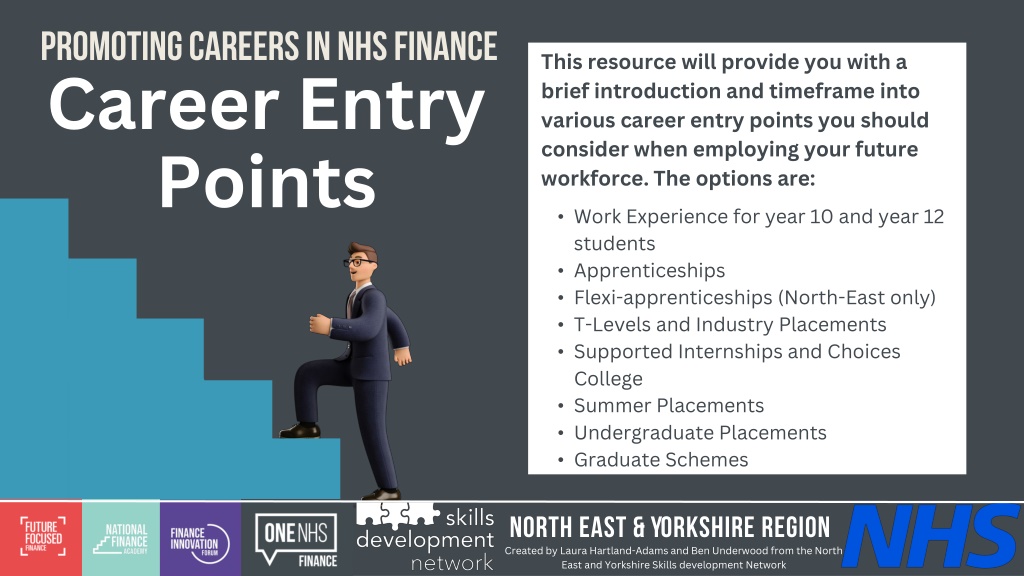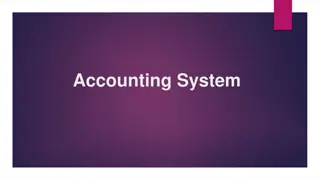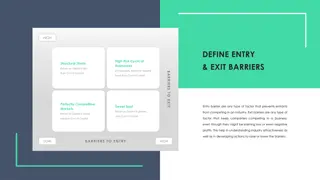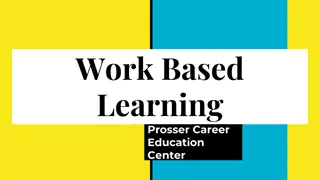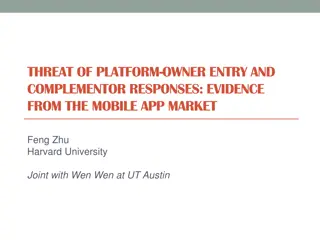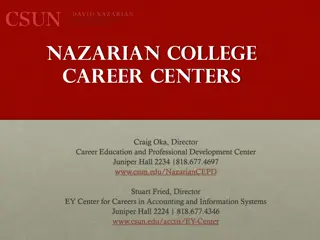Career Entry Points
Explore various career entry points in NHS finance, including work experience, apprenticeships, T-Levels, internships, and more. Get insights on hosting work experience students, benefits of apprenticeships, and pathways for undergraduate and graduate schemes. Unlock the potential to grow your workforce and invest in future talent. Dive into the North East & Yorkshire region's skills development opportunities. Start your journey towards a rewarding career in NHS finance today.
Download Presentation

Please find below an Image/Link to download the presentation.
The content on the website is provided AS IS for your information and personal use only. It may not be sold, licensed, or shared on other websites without obtaining consent from the author. Download presentation by click this link. If you encounter any issues during the download, it is possible that the publisher has removed the file from their server.
E N D
Presentation Transcript
PROMOTING CAREERS IN NHS FINANCE This resource will provide you with a brief introduction and timeframe into various career entry points you should consider when employing your future workforce. The options are: Career Entry Points Work Experience for year 10 and year 12 students Apprenticeships Flexi-apprenticeships (North-East only) T-Levels and Industry Placements Supported Internships and Choices College Summer Placements Undergraduate Placements Graduate Schemes North East & Yorkshire Region Created by Laura Hartland-Adams and Ben Underwood from the North East and Yorkshire Skills development Network
Work Experience Year 10/11 and Year 12 Work experience is an opportunity to introduce young people to the reality of working life. One NHS Finance - Access Accountancy: A useful guide on hosting work experience students Benefits for employers: Grow your own - get access to the up and coming talent of the future. Develop employees - involve your team members in the placement, providing potential management opportunities helping employees feel motivated and loyal to the business. Get additional help at no cost - as an employer, you do not have to pay students on work experience. Achieve a new perspective - young people often bring fresh ideas and approaches which may open up new ways of working and innovation. Coming soon... Our North East and Yorkshire Skills Development Network guide on hosting work experience students QR CODE PROMOTING CAREERS IN THE NHS
Work Experience Year 10/11 and Year 12 September to March April/May Prepare to Host June/Beginning of July Application Process and Deadline Host the Student Ensure you are ready to host the student by creating a plan of action - which projects/streams of work will they get involved in? NOTE - Start date subject to change (depending on the school/college's policy) TIP: You can promote your willingness to host by getting in contact with schools and colleges Step One Step Two Step Three Step Four Step Five End of March April/May Complete all relevant checks and paperwork Decide which student to host The schools/colleges will provide you with everything you need to fill in in order to be able to host their student. PROMOTING CAREERS IN THE NHS
Apprenticeships What are apprenticeships? Here in the North East and Yorkshire Region, we have created an interactive NHS Career Pathway. To access this, scan this QR code: An apprenticeship is a paid job where the employee learns and gains valuable experiences. Alongside on-the-job training, apprentices spend at least 20% of their working hours completing classroom-based learning with a college, university or training provider which leads to a nationally recognised qualification. Benefits of employing an apprentice: Employing an apprentice provides you with an opportunity to fill in any skills gaps, improve the mentoring skills of your team members (development of all staff involved), and expand the diversity of your workforce. Essentially you are investing in the future workforce - by spending the time and effort in training and mentoring an apprentice, you are investing early on in a potentially valuable member of staff's career. In the long run, your team and organisation will benefit from this new employee. Two Apprenticeship Options to consider and offer: Annual recruitment cycle cycle apprenticeships (i.e. school leavers) Immediate start apprenticeships (to fill a vacancy role in your department) Feel free to share when attending career events, schools and events! PROMOTING CAREERS IN THE NHS
Annual Recruitment Cycle Apprenticeships September to March Advertising the Apprenticeship Role September End of April Attend career fairs and schools to promote this career pathway Host and Train your Apprentice Your job is to create a job descriptor and advertise the position you are offering on official and recommended channels (e.g. GOV.uk) Selection process and interviews Duration: minimum of one year Step One Step Two Step Three Step Four Step Five Alternative Apprenticeship Timeframe 'Immediate start' Apprenticeships: Prepare to Host As the title suggests, there are no time restrains and you can offer this to potential candidates whenever you need to fill a vacancy in your department. Use the timeframe above for guidance on the steps to take. March/Early April Ensure you are ready to host the apprentice by creating a plan of action. Consider the following: Which projects/streams of work will the apprentice get involved in? What training will you offer them? Who will mentor them? Application Deadline PROMOTING CAREERS IN THE NHS
Flexible Apprenticeship Scheme (Currently available to the North East only) Through the Flexible Apprenticeship Scheme we plan to provide great opportunities for apprentices to learn valuable skills on the job, with high quality training, whilst also finding a solution to some of the challenges faced throughout our system and build a diverse talent pipeline for the future. The scheme is designed to help employers overcome structural barriers, enabling apprentices to move between employers during the course of their studies and providing necessary support to organisations when they require it. Extract from NECS Flexible Apprenticeship Scheme Use this QR Code to access their Website for more information: This system wide scheme enables us to develop apprentices quickly for areas facing challenges, whilst providing high quality and broad training experience through Health Education England and reducing administrative work for placement employers by employing through the scheme. Placement employers could be any health and care organisation interested in providing a workplace base for the apprentices, either for a set period of time or for the duration of their programme. The scheme aims to support gaps in workforce whilst simultaneously supporting new entrants to join the health and care workforce. PROMOTING CAREERS IN THE NHS
Flexible Apprenticeship Scheme (Currently available to the North East Only) NHS North of England Care System Support (NECS) spokesperson said: NECS are the first NHS organisation in the UK to be part of this innovative apprenticeship scheme. They have been an integral part in the scheme's formation and national success! We are delighted to be able to facilitate the flexi-job apprenticeship offer across the North East and North Cumbria Integrated Care System. We are hugely excited by this scheme which complements our very ambitious NECS 100 programme (giving graduates and 6th form leavers their chance to find a career in the NHS). We look forward to applying that learning and experience to the Flexi-Job Apprenticeship offer and provide even more job and development opportunities to the communities we serve. Here is an extract published by the Department for Education. PROMOTING CAREERS IN THE NHS
Flexible Apprenticeship Scheme (Currently available to the North East Only) Host the Apprentice Advertising the Apprenticeship Role Application Deadline and Interview Process On average, the apprentice will complete a two year placement with multiple organisations or Industries NECS and organisations in the North East need to produce a job descriptor to advertise the role they intend to offer To be determined by NECS and organisations Step Four Step Five Step One Step Two Step Three Some Apprentices will complete all of their placements within NHS organisations whilst others may decide to complete placements with other industries Application Process Prepare to Host Ensure you are ready to host the student by creating a plan of action. Consider the following when planning to host: Which projects/streams of work will they get involved in? Arrange when the apprentice will be housed by which organisation (plan in advance to avoid any issues) When an applicant fills in their application form, they will alert us to the areas and fields in which they want to complete their apprenticeship in. This will help to structure the apprenticeship course. PROMOTING CAREERS IN THE NHS
T-Levels and Industry Placements A simpler approach to vocational training An industry placement is part of a T-Level course - a new qualification for 16-19-year olds that have been designed by employers. T-Level students spend 80% of the course in the classroom, learning the skills that employers need. The other 20% is a meaningful industry placement, where they put these skills into action. Introduction to T-Levels and Industry Placements Industry placements are a shift from traditional work experience to a longer, more structured placement in the workplace for young people to develop real work skills and make a meaningful contribution to your organisation. Placements will last at least 315 hours (approx. 45 days). Department of Education PROMOTING CAREERS IN THE NHS
T-Levels and Industry Placements Register interest to host with a provider (typically a college) Host the student Selection process and interviews with students This will depend on when the student and your department are ready Step Two Step Three Step One Step Four Step Five Prepare to Host Create a Job Descriptor and Advertise your Role Ensure you are ready to host the student by creating a plan of action - which projects/streams of work will they get involved in? PROMOTING CAREERS IN THE NHS
Supported Internships and Choices College Promoting employment opportunities for Interns with learning difficulties/ disabilities and/ or Autism through a supported internship course Choices College is a specialist College providing tailored educational support, and a supported internship course for young adults aged 16-24 with learning difficulties and/or disabilities, and/ or Autism. We partner with NHS healthcare settings, local organisations and private businesses to create supported work environments to provide real work experience for our Interns. Our support is tailored to each Intern, based on their skills and interests. Interns spend 1 year learning maths, English and employability skills and attend up to three, 12-week placements with a Choices College Partner. Extract from Health Education England To learn more, please visit the Health Education England Website Timeframe of support offered by Health Education England PROMOTING CAREERS IN THE NHS
Summer Placements Summer internships are often an important part of a student's educational experience and can provide several benefits in terms of furthering their career. This includes: The ability to gain hands-on experience in the career field they are interested in An opportunity to explore different career paths if they are undecided The chance to develop important skills needed for their chosen career Experiences they can list on their CV when applying for jobs The ability to build relationships and a network with professionals in the world of Finance An additional benefit to consider is the timing of this placement - many members of staff book annual leave during June till August and departments tend to be short staffed. PROMOTING CAREERS IN THE NHS
Summer Placements September/October June/End of August End of April Advertise a summer placement at the beginning of the academic year Host the Student Interview Process NOTE - Start date subject to change (depending on end of university year) Step One Step Two Step Three Step Four Step Five Prepare to Host March/Early April Application Deadline Ensure you are ready to host the student by creating a plan of action - which projects/streams of work will they get involved in? PROMOTING CAREERS IN THE NHS
Undergraduate Work Placements A Year in Industry Many university courses include a placement year for students to gain 'real world' business experience. A placement year allows the student to take a paid, full-time work placement for 9-12 months which will help... Develop practical workplace and life skills, and gain valuable work experience Decide what kind of job and career path the student will want to pursue when they graduate Demonstrate to employers that they are independent, capable and confident of adapting to a working environment Build links and networks with potential employers and if they impress you, you can offer them a job upon completion of their university degree (talent pool). To learn more about Work Placements, scan this QR code: PROMOTING CAREERS IN THE NHS
Undergraduate Work Placements One year prior to the start of placement September September Application Process As an organisation, you will need to advertise your placements with universities and attend events to promote them. End of April Host the Student Interview Process Duration: 9-12 Months Step One Step Two Step Three Step Four Step Five May-August March/Beginning of April Set up meetings/lunches with yourstudent prior to the start of their placment to build a healthy and professsional relationship Prepare to Host Ensure you are ready to host by creating a plan of action: which projects/streams of work will they get involved in? Pre-employment Checks Ensuring the student is eligible to work at your organisation Application Deadline PROMOTING CAREERS IN THE NHS
Graduate Scheme The timeframe provided on the next slide is a template extracted from the NHS Procurement graduate scheme and is not accurate - it is intended to provide you with an idea of the timescales to expect when the scheme is up and running. Here in the North East and Yorkshire Region, we are establishing a new finance graduate scheme - our aim and intention for this scheme is to train and recruit graduates to become the next generation of accountants, middle managers and beyond. The model for the Finance graduate scheme will be based on the NHS Procurement Graduate Training Scheme which was established in 2020 by the Yorkshire & Humber Skills Development Network. This procurement scheme is a proven model that has been rolled out as a national scheme used throughout all regions of England. The Procurement scheme is a highly focused development pathway for graduates to become the next NHS procurement middle managers and beyond. This is what we intent to replicate for our finance department. To find out more about the NHS Procurement Graduate Scheme - Contact: lauren.butcher3@nhs.net More information will be released in due course. PROMOTING CAREERS IN THE NHS
Graduate Scheme September Start date Host the Graduate November March/April Student - Application Process Organisation - Advertise Placement As an organisation, you will need to advertise your placements with universities and attend events to promote them. Attend Assessment Centres SDN shortlist the best candidates for you and pair you up with graduates who suit your organisation's needs Induction into your organisation followed by a two- year programme with SDN Step Two Step Five Step One Step Three Step Four Remember This is a template and we will confirm the timeframe once the scheme is up and running May February Successful Graduate On-boarding Application Deadline & Advertisement Closes Pre-employment checks and preparing to host - you will need to ensure you are ready to host by creating a plan of action. Which projects/streams of work will they get involved in? PROMOTING CAREERS IN THE NHS
